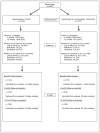The impact on anxiety and perceived control of a short one-on-one nursing intervention designed to decrease treatment seeking delay in people with coronary heart disease
- PMID: 21126918
- PMCID: PMC3085630
- DOI: 10.1016/j.ejcnurse.2010.11.003
The impact on anxiety and perceived control of a short one-on-one nursing intervention designed to decrease treatment seeking delay in people with coronary heart disease
Abstract
Background: Patient delay in seeking treatment for acute coronary syndrome symptoms remains a problem. Thus, it is vital to test interventions to improve this behavior, but at the same time it is essential that interventions not increase anxiety.
Purpose: To determine the impact on anxiety and perceived control of an individual face-to-face education and counseling intervention designed to decrease patient delay in seeking treatment for acute coronary syndrome symptoms.
Methods: This was a multicenter randomized controlled trial of the intervention in which anxiety data were collected at baseline, 3-months and 12-months. A total of 3522 patients with confirmed coronary artery disease were enrolled; data from 2597 patients with anxiety data at all time points are included. The intervention was a 45 min education and counseling session, in which the social, cognitive and emotional responses to acute coronary syndrome symptoms were discussed as were barriers to early treatment seeking. Repeated measures analysis of covariance was used to compare anxiety and perceived control levels across time between the groups controlling for age, gender, ethnicity, education level, and comorbidities.
Results: There were significant differences in anxiety by group (p = 0.03). Anxiety level was stable in patients in the control group, but decreased across time in the intervention group. Perceived control increased across time in the intervention group and remained unchanged in the control group (p = 0.01).
Conclusion: Interventions in which cardiac patients directly confront the possibility of an acute cardiac event do not cause anxiety if they provide patients with appropriate strategies for managing symptoms.
Figures
Similar articles
-
Interventions to increase patient and family involvement in escalation of care for acute life-threatening illness in community health and hospital settings.Cochrane Database Syst Rev. 2020 Dec 8;12(12):CD012829. doi: 10.1002/14651858.CD012829.pub2. Cochrane Database Syst Rev. 2020. PMID: 33285618 Free PMC article.
-
The effect of a short one-on-one nursing intervention on knowledge, attitudes and beliefs related to response to acute coronary syndrome in people with coronary heart disease: a randomized controlled trial.Int J Nurs Stud. 2009 Aug;46(8):1037-46. doi: 10.1016/j.ijnurstu.2009.01.012. Epub 2009 Feb 24. Int J Nurs Stud. 2009. PMID: 19243778 Free PMC article. Clinical Trial.
-
A nursing intervention to reduce prehospital delay in acute coronary syndrome: a randomized clinical trial.J Cardiovasc Nurs. 2006 May-Jun;21(3):186-93. doi: 10.1097/00005082-200605000-00006. J Cardiovasc Nurs. 2006. PMID: 16699358 Clinical Trial.
-
A randomized controlled trial to reduce delay in older adults seeking help for symptoms of acute myocardial infarction.Res Nurs Health. 2007 Oct;30(5):485-97. doi: 10.1002/nur.20245. Res Nurs Health. 2007. PMID: 17893930 Clinical Trial.
-
Behavioural modification interventions for medically unexplained symptoms in primary care: systematic reviews and economic evaluation.Health Technol Assess. 2020 Sep;24(46):1-490. doi: 10.3310/hta24460. Health Technol Assess. 2020. PMID: 32975190 Free PMC article.
Cited by
-
Treatment of Anxiety in Patients With Coronary Heart Disease: A Systematic Review.Psychosomatics. 2018 Jul-Aug;59(4):318-332. doi: 10.1016/j.psym.2018.03.008. Epub 2018 Mar 27. Psychosomatics. 2018. PMID: 29735242 Free PMC article.
-
Patient education in the management of coronary heart disease.Cochrane Database Syst Rev. 2017 Jun 28;6(6):CD008895. doi: 10.1002/14651858.CD008895.pub3. Cochrane Database Syst Rev. 2017. PMID: 28658719 Free PMC article.
-
Interventions to increase patient and family involvement in escalation of care for acute life-threatening illness in community health and hospital settings.Cochrane Database Syst Rev. 2020 Dec 8;12(12):CD012829. doi: 10.1002/14651858.CD012829.pub2. Cochrane Database Syst Rev. 2020. PMID: 33285618 Free PMC article.
-
The effect of hydroxy safflower yellow A on coronary heart disease through Bcl-2/Bax and PPAR-γ.Exp Ther Med. 2018 Jan;15(1):520-526. doi: 10.3892/etm.2017.5414. Epub 2017 Nov 1. Exp Ther Med. 2018. PMID: 29399062 Free PMC article.
References
-
- Luepker RV, Raczynski JM, Osganian S, Goldberg RJ, Finnegan JR, Jr, Hedges JR, et al. Effect of a community intervention on patient delay and emergency medical service use in acute coronary heart disease: The Rapid Early Action for Coronary Treatment (REACT) Trial. JAMA. 2000;284:60–7. - PubMed
-
- Moser DK, Kimble LP, Alberts MJ, Alonzo A, Croft JB, Dracup K, et al. Reducing delay in seeking treatment by patients with acute coronary syndrome and stroke: A scientific statement from the American Heart Association Council on Cardiovascular Nursing and Stroke Council. Circulation. 2006;114:168–82. - PubMed
-
- Goff DC, Jr, Feldman HA, McGovern PG, Goldberg RJ, Simons-Morton DG, Cornell CE, et al. Prehospital delay in patients hospitalized with heart attack symptoms in the United States: the REACT trial. Rapid Early Action for Coronary Treatment (REACT) Study Group. Am Heart J. 1999;138:1046–57. - PubMed
-
- Goldberg RJ, Steg PG, Sadiq I, Granger CB, Jackson EA, Budaj A, et al. Extent of, and factors associated with, delay to hospital presentation in patients with acute coronary disease (the GRACE registry) Am J Cardiol. 2002;89:791–6. - PubMed
-
- Goldberg RJ, Yarzebski J, Lessard D, Gore JM. Decade-long trends and factors associated with time to hospital presentation in patients with acute myocardial infarction: the Worcester Heart Attack study. Arch Intern Med. 2000;160:3217–23. - PubMed





